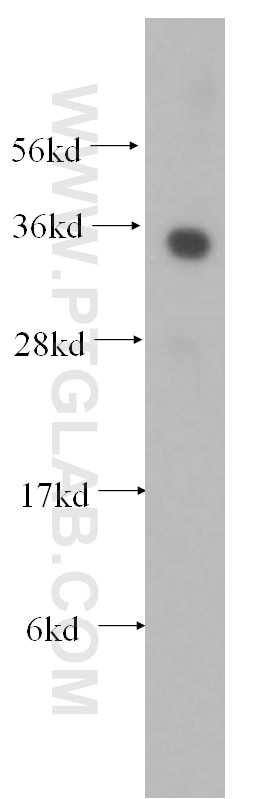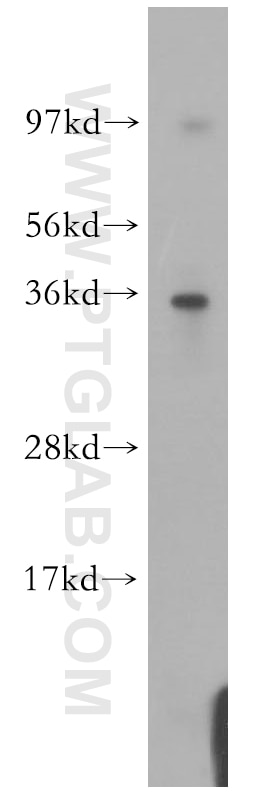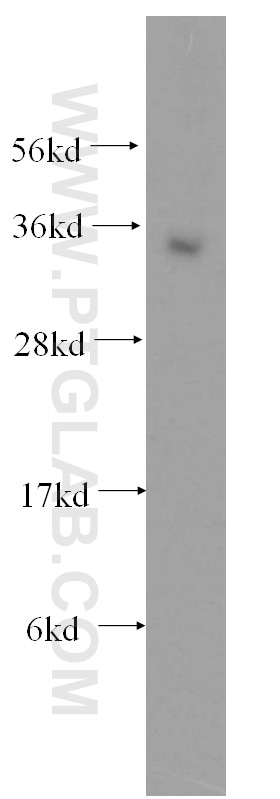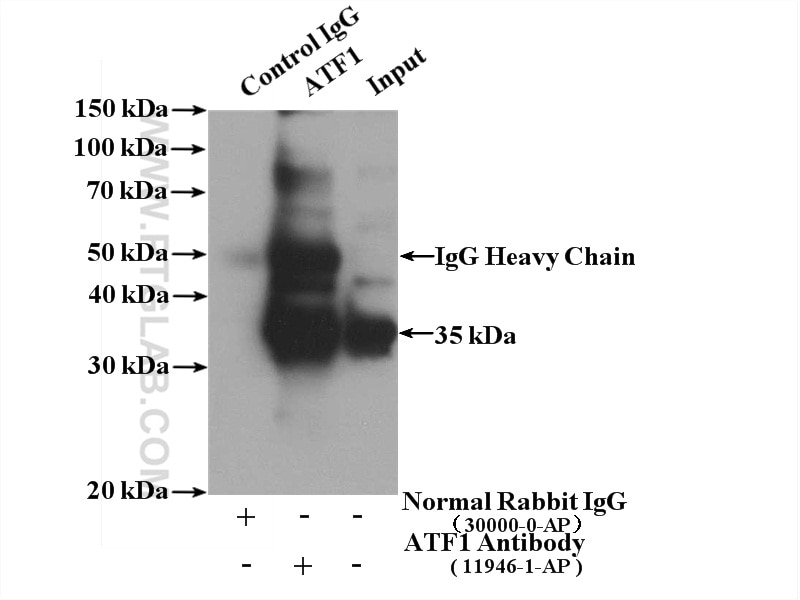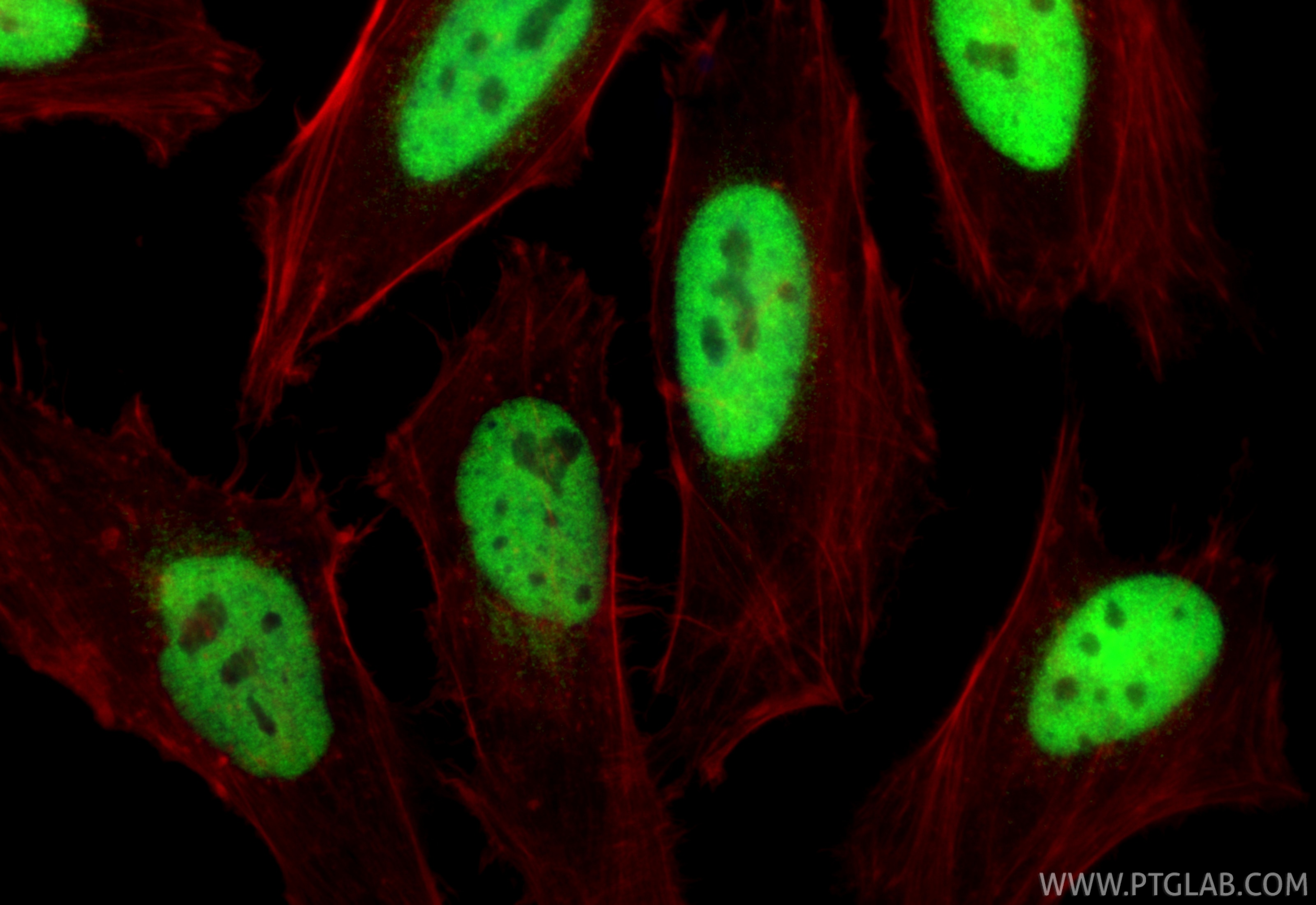Tested Applications
| Positive WB detected in | HeLa cells, A431 cells, human brain tissue |
| Positive IP detected in | HeLa cells |
| Positive IF/ICC detected in | HeLa cells |
Recommended dilution
| Application | Dilution |
|---|---|
| Western Blot (WB) | WB : 1:500-1:1000 |
| Immunoprecipitation (IP) | IP : 0.5-4.0 ug for 1.0-3.0 mg of total protein lysate |
| Immunofluorescence (IF)/ICC | IF/ICC : 1:500-1:2000 |
| It is recommended that this reagent should be titrated in each testing system to obtain optimal results. | |
| Sample-dependent, Check data in validation data gallery. | |
Published Applications
| KD/KO | See 4 publications below |
| WB | See 10 publications below |
| IHC | See 1 publications below |
Product Information
11946-1-AP targets ATF1 in WB, IHC, IF/ICC, IP, ELISA applications and shows reactivity with human samples.
| Tested Reactivity | human |
| Cited Reactivity | human, mouse |
| Host / Isotype | Rabbit / IgG |
| Class | Polyclonal |
| Type | Antibody |
| Immunogen |
CatNo: Ag2548 Product name: Recombinant human ATF1 protein Source: e coli.-derived, T-GST Tag: GST Domain: 1-271 aa of BC029619 Sequence: MEDSHKSTTSETAPQPGSAVQGAHISHIAQQVSSLSESEESQDSSDSIGSSQKAHGILARRPSYRKILKDLSSEDTRGRKGDGENSGVSAAVTSMSVPTPIYQTSSGQYIAIAPNGALQLASPGTDGVQGLQTLTMTNSGSTQQGTTILQYAQTSDGQQILVPSNQVVVQTASGDMQTYQIRTTPSATSLPQTVVMTSPVTLTSQTTKTDDPQLKREIRLMKNREAARECRRKKKEYVKCLENRVAVLENQNKTLIEELKTLKDLYSNKSV Predict reactive species |
| Full Name | activating transcription factor 1 |
| Calculated Molecular Weight | 271 aa, 29 kDa |
| Observed Molecular Weight | 35-40 kDa |
| GenBank Accession Number | BC029619 |
| Gene Symbol | ATF1 |
| Gene ID (NCBI) | 466 |
| RRID | AB_2060777 |
| Conjugate | Unconjugated |
| Form | Liquid |
| Purification Method | Antigen affinity purification |
| UNIPROT ID | P18846 |
| Storage Buffer | PBS with 0.02% sodium azide and 50% glycerol, pH 7.3. |
| Storage Conditions | Store at -20°C. Stable for one year after shipment. Aliquoting is unnecessary for -20oC storage. 20ul sizes contain 0.1% BSA. |
Background Information
TFs play a vital role in maintaining cell homeostasis by combining DNA regulatory sequences to regulate gene transcription rates. Activating transcription factor 1 (ATF1) is a member of the ATF/CREB family of transcription factors (TFs), specifically interacting with the consensus ATF/CRE site 'TGACGTCA'(PMID: 28032861). ATF1 transcriptionally regulates the expressions of target genes to mediate various cellular processes, and ATF1 effects the progression of tumors (including lung cancer, colorectal cancer,and nasopharyngeal carcinoma).
Protocols
| Product Specific Protocols | |
|---|---|
| IF protocol for ATF1 antibody 11946-1-AP | Download protocol |
| IP protocol for ATF1 antibody 11946-1-AP | Download protocol |
| WB protocol for ATF1 antibody 11946-1-AP | Download protocol |
| Standard Protocols | |
|---|---|
| Click here to view our Standard Protocols |
Publications
| Species | Application | Title |
|---|---|---|
J Adv Res Transducin-like enhancer of split 3 protects against lipopolysaccharide-induced inflammation through DDX5-ATF1-PPP2R5A signaling | ||
Am J Hum Genet Systematic Functional Interrogation of Genes in GWAS Loci Identified ATF1 as a Key Driver in Colorectal Cancer Modulated by a Promoter-Enhancer Interaction.
| ||
Mol Ther Nucleic Acids Mbd2 deficiency alleviates retinal cell apoptosisvia the miR-345-5p/Atf1 axis in high glucoseinjury and streptozotocin-induced diabetic mice. | ||
Front Cell Dev Biol CREB1 and ATF1 Negatively Regulate Glutathione Biosynthesis Sensitizing Cells to Oxidative Stress.
| ||
J Biol Chem The mRNA levels of heat shock factor 1 are regulated by thermogenic signals via the cAMP-dependent transcription factor ATF3. |

